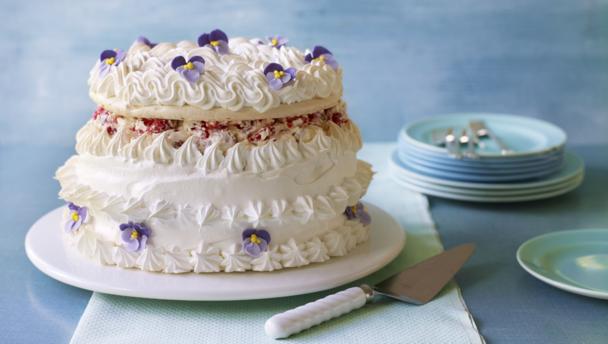Spanische Windtorte

Ingredients
For the French meringue shell
- 8 large free-range egg whites
- ½ tsp cream of tartar
- 475g/1lb 1oz caster sugar
For the fondant violets
- 25g/1oz dusky lavender ready-to-roll icing
- 25g/1oz deep purple ready-to-roll icing
- 10g/¼oz yellow ready-to-roll icing
For the Swiss meringue decoration
- 4 large free-range egg whites
- 250g/9oz caster sugar
For the filling
- 600ml/20fl oz double cream
- 50g/1¾oz icing sugar, plus extra for dusting
- 1 tsp orange blossom water
- 400g/14oz strawberries, roughly chopped
- 200g/7oz raspberries
Method
-
Line 3 large baking trays with baking parchment. Draw 2 x 20cm/8in circles on 2 of the trays and 1 x 20cm/8in circle on 1 of the trays. (You should end up with 5 x 20cm/8in circles). Preheat the oven to 120C/100C Fan/Gas ½.
-
For the meringue shell, tip the egg whites and cream of tartar into a large spotlessly clean bowl and whisk with an electric mixer on high speed until the whites form stiff peaks. Add the caster sugar, a tablespoon at a time, whisking continuously to make a thick, glossy meringue.
-
Spoon two-thirds of the meringue into a piping bag fitted with a 1.5cm/⅝in plain nozzle. Pipe a thick ring inside one of the circles on the baking tray and continue spiraling until the entire circle is filled. Repeat with a second circle. These create the base and the top of the meringue cake.
-
Repeat the process with the 3 remaining circles, except don't fill in the circles, so that you have three hoops of meringue - these create the sides of the meringue shell. Bake for 45 minutes. Remove from the oven and leave to cool.
-
Meanwhile, make the fondant violets. For each fondant violet, roll 2 little pieces of dusky lavender fondant and 3 small pieces of deep purple lavender into small balls (about the size of an orange pip). Dust 2 pieces of greaseproof paper with icing sugar and place the balls of fondant between the sheets of greaseproof and flatten each ball out with your fingers, to a thin circle, approximately 1cm/½in in diameter - these form the petals. Roll a tiny piece of yellow fondant into 3 tiny balls, to form the stamens.
-
Using a small paintbrush and a tiny amount of water, stick the petals and stamens together to form a violet, with the 2 dusky lavender petals at the top, 2 dark purple petals below them and the remaining dark purple petal on the bottom, in the middle. Press the yellow stamens into the centre. Repeat to make 13 violets. Leave to dry on greaseproof paper for at least 1 hour.
-
When the meringues are dry, gently slide 1 of the cooked, filled meringues onto a 30cm/12in heatproof (to 120C) serving plate. Spoon the remaining meringue into the piping bag and pipe 8 blobs of meringue, evenly spaced around the edge of the circle. Place 1 of the meringue hoops on top and press down very gently to stick the hoop to the base.
-
Repeat the process with the remaining 2 hoops of meringue. Roughly pipe the remaining one-third of meringue around the sides to disguise the hoops. Using a spatula smooth out the meringue so that the sides are smooth and straight and look like a cake. Bake on the serving plate for 45 minutes. Remove from the oven and leave to cool.
-
For the Swiss meringue decoration, set a large mixing bowl over a pan of gently simmering water. Tip the egg whites and sugar into the bowl and whisk until the sugar is dissolved and the meringue reaches 70C on a sugar thermometer.
-
Remove from the heat and continue whisking until cool and stiff. Spoon the meringue into a piping bag fitted with a large star nozzle. Pipe a pretty border around the base, the middle and the top edge of the meringue shell. Pipe a border around the outside edge and the middle of the filled meringue circle that will become the lid. Bake for 30 minutes. Remove from the oven and leave to cool.
-
For the filling, whip the cream and icing sugar together in a bowl until soft peaks form when the whisk is removed from the bowl. Whisk in the orange blossom water and gently fold in the strawberries and raspberries. Spoon into the cooled meringue cake shell. Top with the meringue lid.
-
To decorate, use tiny blobs of meringue to stick 6 violets around the middle piped border on the sides of the cake, 6 violets around the top of the cake and 1 violet in the centre of the top of the cake. Serve immediately.